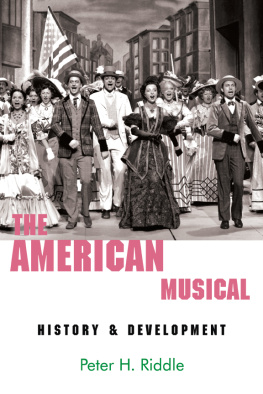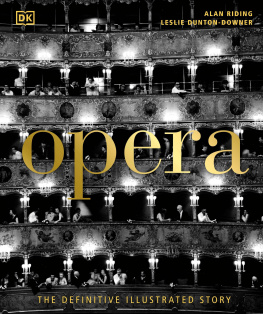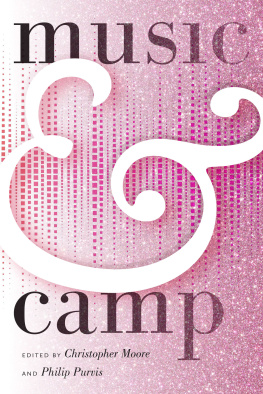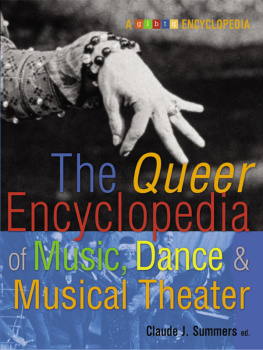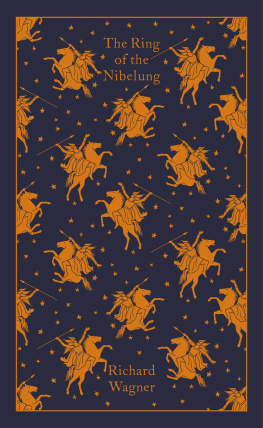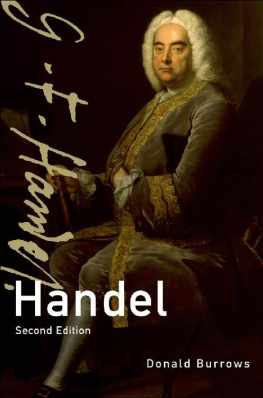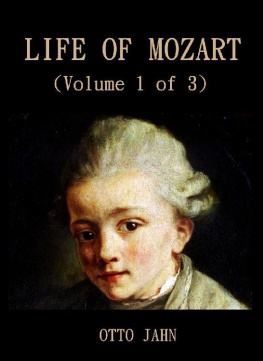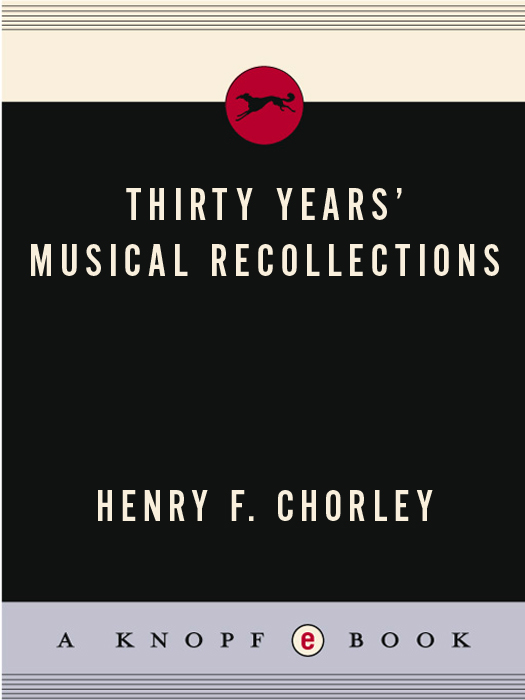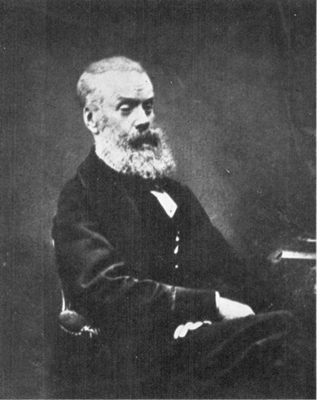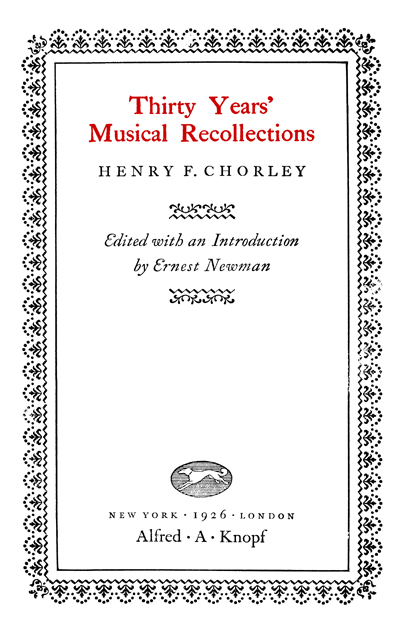HENRY F. CHORLEY
COPYRIGHT, 1926, BY ALFRED A. KNOPF, INC.
eBook ISBN: 978-0-307-83079-1
v3.1
INTRODUCTION
I
It is difficult for the musical critic to achieve any immortality except one of opprobrium. He is remembered solely by his few misses; his many hits are not counted to him. The reason is obvious. If he talks sense, his views become the commonplaces of later musical opinion, and no one thinks of crediting him in particular with them. If he talks nonsense, this is regarded as peculiarly his own, and it is sure to be brought up against him later by some musical biographer or other who wants to intensify the sympathetic atmosphere surrounding his hero by showing how sadly sympathy was lacking to him while he was alive. Thus Hanslick, because the Wagnerians hated him, and Wagner happens to have turned out to be a winning card, has become a byword to tens of thousands of people who have never read a page of Hanslick for themselves, and are completely ignorant not only of his views on music in general but even of his real attitude towards Wagner. And because Chorley also failed to foresee the overlordship of Wagner he too is a joke and a sore shame, as Nietzsche says of the ape, in the eyes of modern writers on music who know no more about him at first-hand than they do of Confucius. Chorley, like the rest of us, had his limitations, but he was anything but the fool most people of to-day imagine him to have been. In his own sphere he was a very able man. To say that he did not transcend either his own limitations or those of his epoch is merely to say that he was human. Wagner himself showed equivalent limitations. As regards his judgment of individuals, posterity does not agree with Wagners judgment of Schumann, Chopin, Brahms and others. As regards general principles, a vast amount of his theorising is dead to-day because it was too purely the expression of the transitory point of view of his own day. I am not attempting to justify Chorley as against Wagner. I am merely pointing out that the greatest of us show our humanity by occasionally erring. Chorley, like other people, came to grief when he tackled a subject that was too big for him; but on a subject of his own size he was a writer of undoubted sense and shrewdness. It is in virtue of these qualities that his Thirty Years Musical Recollections is worth re-issuing to-day, more than sixty years after it was written.
He was a prominent figure not only in the English but in the European musical world of his time; in Germany he was perhaps the only English critic whose opinion counted for anything. In England he exercised a great influence through his long association, extending over thirty years, with the Athenaeum. His life was a varied one, and his work contains many a sobering lesson for the musical criticism of this or any future time. For some years before his death he had been engaged on an autobiography. This has never been published, and perhaps the day for a complete issue of it has gone by. But a year or so after his death a full memoir of him by his friend Mr. H. G. Hewlett appeared, in which copious use was made of the autobiography and other private papers.
II
Henry Fothergill Chorley, the third son and fourth child of John and Jane Chorley, was born at Blackley Hurst, near Billinge, Lancashire, on the 17th December, 1808. The family was an old and honourable Quaker one that had come down in the world. John Chorley was an ironworker whose business was none too flourishing; he dropped dead in his counting house on the 15th April, 1816, leaving his widow and children in rather poor circumstances. She was helped, then and later, by her half-brother, John Rutter, a Liverpool medical man. Henry Chorley seems to have inherited from his father a tendency to heart disease. His health was never robust, and a good deal of his melancholy,perhaps even of the conservatism with which he was so frequently reproached in his later years,may have been due in part to the excessive demands made by a too strenuous life on a deficient physical vitality.
The irritation that also became more marked during his last few years was the natural outcome of the excessive sensitiveness he showed as a child. As a result partly of the circumstances of the family, partly of his own physical and mental make-up, he was very much alone as a child, not caring greatly for games for which he had not the constitution, and given to the introspective use of his imagination. If my own recollections go back to a very early date in life, he says, it is probably because my powers of observation were prematurely sharpened by being either left to myself or living with grown people: As boys from childhood, my two brothers cronied together, leaving the youngest, weakest and ugliest as the odd one; and my sister early became my mothers companion. I have thus, from infancy, been alone as regards family confidence or comradeship; and the subsequent periods of life at which this condition of solitude has been partly counteracted have been few and far between.
The family more than once changed its place of residence during his childhood, though it always remained in Lancashire. His mother, a gentle and imaginative woman, was a moderate pianist, and Chorley seems to have picked up the rudiments of music for himself at an early age. As the years went on, the boy became more and more isolated. He speaks of his life about that time as years of wakeningyears, too, of some suffering; and then, for the first time, I began to feel the yearnings for companionship which beset one of an affectionate nature, a fanciful imagination, and a social humour, placed by circumstances in a solitary position. On her widowhood, my mother possessed herself of my sister as her chosen companion, and my two elder brothers, as I have said, cronied together. I was the smallest, the worst-looking, the most nervous; not a coward, though reported such, because of great physical excitability; totally inexpert with my hands and at all the manly games in which boys delight; therefore mocked at, and left alone, without any excessive persecution, but without any influence to encourage, assist, or befriend me.
Such education as he had at this time was irregular and informal. He learned easily what interested him, and his memory was excellent; later the accuracy of it in musical matters aroused the astonishment of many good musicians. He was self-centred, and the grown man can be seen in the portrait he gives of himself as a child. From first to last, to me, all schooling was intolerable. I was hopelessly idleperhaps because, in some things, I was precociously quick, having been started in the world with a memory of no common compass and strength, and with that sort of


